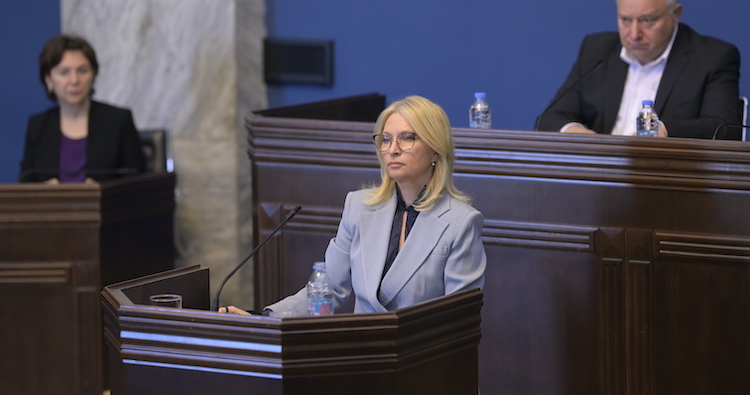Acting National Bank Governor: Georgia’s macroeconomic fundamentals “strong”, fluctuations in financial market “short-term”

Natia Turnava, the Acting Governor of the National Bank of Georgia, on Monday said the country’s macroeconomic fundamentals were “strong” and called fluctuations in the financial market “short-term”. Photo: NBG
Natia Turnava, the Acting Governor of the National Bank of Georgia, on Monday said the country’s macroeconomic fundamentals were “strong” and called fluctuations in the financial market “short-term”.
Georgia’s macroeconomic fundamentals remain robust, with a 7.5 percent increase in real gross domestic product in 2023, driven primarily by investments. In particular, investments have contributed 5.4 percentage points to economic growth”, she said while presenting the 2023 report to the Budget and Finance Committee of the Parliament.
Turnava added the “strong” economic growth was continuing in 2024, with an average growth of 7.8 percent in the first three months.
The Acting Governor noted the current account deficit in 2023 was at a “historic low figure” of 4.3 percent of GDP. She also mentioned the exchange rate had “strengthened”, contributing to a “reduced” inflation.
There is no indication that any fundamental macroeconomic factor is experiencing negative dynamics - therefore, the short-term [market fluctuations] is caused by artificial agitation, negative expectations [which] create a sense of instability [...] to which market actors react, but since there is no fundamental factor behind it […] I would like to remind you this is a short-term effect”, she said.
Speaking about inflation, Turnava said it was expected to remain below the target of three percent after March 2023. She said the central bank had responded to inflationary trends by adjusting the monetary policy rate from 11 percent at the beginning of 2023 to eight percent at present.
Since inflationary expectations have come down, it has given us an opportunity to gradually reduce the refinancing rate. On the one hand, this had a positive impact on the availability of [the national currency] lari resources in the country. The lari resource becomes more accessible to our population, which contributes to long-term sustainable economic growth and, at the same time, eases the debt burden”, she said.
Turnava added the Bank was diversifying its international reserves by adding monetary gold as a “strategic decision” to hedge against global inflation.
Monetary gold is the safest asset and the best hedge against global inflation. Additionally, gold is considered as one of the safest, most liquid, and profitable assets. We should aim to not only increase reserves, but also to diversify them among different investment instruments in order to protect their purchasing power”, the Acting Governor noted.
She added an eight of the total currency reserves of the world's central banks were held in gold, while central banks collectively owned 20 percent of the total gold reserves.
Turnava said dollarisation remained “one of the main challenges” of the financial sector.
The National Bank is actively working to reduce the structural risks caused by the high level of financial dollarisation. Tangible progress has been made as a result of the measures taken by the National Bank. Public confidence in the lari has shown significant growth”, she told MPs.
We have achieved a historic result: the amount of lari deposits in the banking system has exceeded foreign currency deposits, indicating high confidence in it. After the announcement of the de-dollarisation plan, the level of dollarisation decreased by about 20 percent. Currently, the dollarisation of loans stands at 45 percent and that of deposits at 49 percent”, the official added.
She also said the central bank had increased the lower limit for foreign currency loans from ₾200,000 ($73,809) to ₾400,000 ($147,619) this year, adding as a result, consumer and micro loans were being issued “almost in full” and 95 percent of mortgage loans were being issued in lari.
She emphasised the decision aimed to “protect the most vulnerable borrowers” from currency risks. Borrowers with income in relevant foreign currencies were exempted from this restriction, she said.
Speaking at the Committee session, Turnava also highlighted the “active cooperation” with the European Central Bank and EU member states following the country’s attainment of the EU membership candidate status.
She said the cooperation included participation in the economic and financial dialogue in Brussels, where the fiscal and monetary policies of candidate countries were discussed, and claimed Georgia stood out in economic growth and low inflation compared to other candidate countries.
She also told lawmakers the National Bank was “actively engaged” in joint projects with international organisations and was currently in communication with central banks of EU member states regarding technical assistance.
 Tweet
Tweet  Share
Share